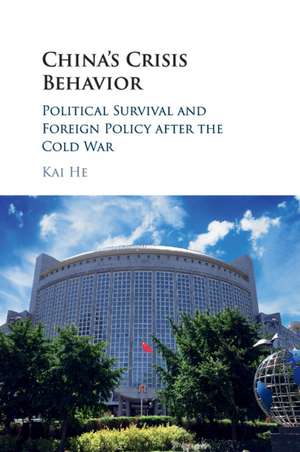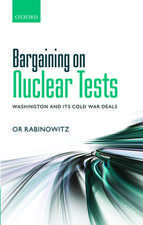China's Crisis Behavior: Political Survival and Foreign Policy after the Cold War
Autor Kai Heen Limba Engleză Paperback – 28 feb 2018
| Toate formatele și edițiile | Preț | Express |
|---|---|---|
| Paperback (1) | 277.36 lei 6-8 săpt. | |
| Cambridge University Press – 28 feb 2018 | 277.36 lei 6-8 săpt. | |
| Hardback (1) | 688.86 lei 6-8 săpt. | |
| Cambridge University Press – 5 apr 2016 | 688.86 lei 6-8 săpt. |
Preț: 277.36 lei
Nou
Puncte Express: 416
Preț estimativ în valută:
53.12€ • 54.73$ • 44.50£
53.12€ • 54.73$ • 44.50£
Carte tipărită la comandă
Livrare economică 25 februarie-11 martie
Preluare comenzi: 021 569.72.76
Specificații
ISBN-13: 9781316506783
ISBN-10: 1316506789
Pagini: 184
Ilustrații: 3 b/w illus. 3 tables
Dimensiuni: 153 x 230 x 10 mm
Greutate: 0.25 kg
Editura: Cambridge University Press
Colecția Cambridge University Press
Locul publicării:Cambridge, United Kingdom
ISBN-10: 1316506789
Pagini: 184
Ilustrații: 3 b/w illus. 3 tables
Dimensiuni: 153 x 230 x 10 mm
Greutate: 0.25 kg
Editura: Cambridge University Press
Colecția Cambridge University Press
Locul publicării:Cambridge, United Kingdom
Cuprins
1. China's foreign policy crises after the Cold War; 2. Political survival and China's crisis behavior; 3. The Yinhe incident and the Taiwan Strait crisis; 4. The embassy bombing incident and the EP-3 mid-air collision; 5. The Impeccable incident and the boat collision crisis; 6. The Scarborough shoal dispute and Diaoyu/Senkaku purchase crisis; 7. Leadership transition and China's future crisis behavior; Conclusion.
Recenzii
'Kai He provides an excellent analysis of China's inter-state crises behaviour in the post-Cold War era. By combining insights from prospect theory and regime survival theory, he offers a valuable analysis of a crucial set of cases in a rigorous fashion. This book is not only useful for Sinologists, but also for anyone interested in China's sometimes enigmatic behaviour in its relations with other states.' T. V. Paul, James McGill Professor of International Relations, McGill University, Montréal
'Kai He's cutting edge study of Chinese crisis management is essential reading for students of Chinese foreign policy as well as anyone seeking insights into an increasingly assertive twenty-first century China. China's Crisis Behavior operationalizes an elegant and innovative theoretical framework to examine a timely and critically important topic for Asia and the world. This pioneering volume provides comprehensive and authoritative treatment of multiple cases of Chinese crises spanning a twenty-year period under three different paramount Chinese leaders, including current President Xi Jinping. Highly recommended.' Andrew Scobell, Senior Political Scientist, RAND Corporation
'When embroiled in international crises, Chinese leaders escalate in some cases, yet accommodate, even compromise in others: why? In this astute, original book, Kai He argues that nothing about Chinese leaders' international crises behavior can be understood without grasping how they see their prospect for political survival. Their perceptions of gains and losses are shaped by international pressure, the severity of the crisis, and the leaders' domestic authority which combine to define China's responses. With a concern for the choices of individual leaders in crisis situations, Kai He cleverly puts to the task prospect theory, the most influential descriptive theory of decision making under risk, and relies on a wealth of fresh sources to help us understand how Chinese leaders are likely to behave when the next crisis erupts. For anyone interested in China's rise, crisis diplomacy and the political psychology of strategy, this is an essential read.' Pascal Vennesson, Nanyang Technological University, Singapore
'Kai He's cutting edge study of Chinese crisis management is essential reading for students of Chinese foreign policy as well as anyone seeking insights into an increasingly assertive twenty-first century China. China's Crisis Behavior operationalizes an elegant and innovative theoretical framework to examine a timely and critically important topic for Asia and the world. This pioneering volume provides comprehensive and authoritative treatment of multiple cases of Chinese crises spanning a twenty-year period under three different paramount Chinese leaders, including current President Xi Jinping. Highly recommended.' Andrew Scobell, Senior Political Scientist, RAND Corporation
'When embroiled in international crises, Chinese leaders escalate in some cases, yet accommodate, even compromise in others: why? In this astute, original book, Kai He argues that nothing about Chinese leaders' international crises behavior can be understood without grasping how they see their prospect for political survival. Their perceptions of gains and losses are shaped by international pressure, the severity of the crisis, and the leaders' domestic authority which combine to define China's responses. With a concern for the choices of individual leaders in crisis situations, Kai He cleverly puts to the task prospect theory, the most influential descriptive theory of decision making under risk, and relies on a wealth of fresh sources to help us understand how Chinese leaders are likely to behave when the next crisis erupts. For anyone interested in China's rise, crisis diplomacy and the political psychology of strategy, this is an essential read.' Pascal Vennesson, Nanyang Technological University, Singapore
Notă biografică
Descriere
The first study to systematically analyze the patterns of China's foreign policy crisis behavior after the Cold War.










